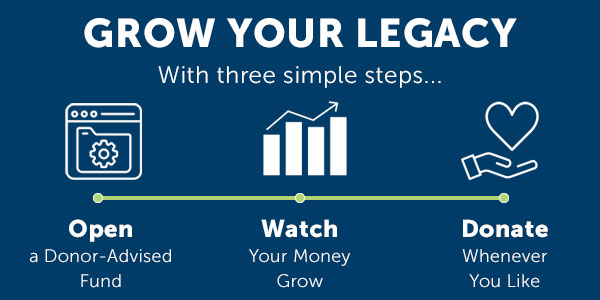- About Us
-
-
About Us
-
-
-

-
“This is an opportunity for our students to provide more for their families, for our students who may not have access to the resources that others do. It’s a blessing for the students who need that support.”
Randall Ward, Director of Student Services, Capital Community College in Hartford
-
- Find Help
- Ways to Give
- Volunteer
- Donate
- Partner Programs
Donor Advised Funds

What Is a Donor Advised Fund?
A Donor Advised Fund (DAF) provides donors with a centralized charitable giving vehicle. It allows individuals, families, and corporations to make an irrevocable charitable gift to a public charity that sponsors a DAF program and provides donors an immediate tax deduction. Typical institutions that sponsor DAF programs include, but are not limited to, Charles Schwab, Fidelity, Vanguard, and many Community Foundations. Most sponsoring organizations of DAFs accept cash equivalents, securities, and certain other assets.
How does it work?
• Establish your DAF by making an irrevocable, tax-deductible donation to a public charity that sponsors a DAF program.
• Advise the investment allocation of the donated assets (any investment growth is tax-free).
• Recommend grants to qualified public charities of your choice.
Main advantages of a donor-advised fund
• Simplicity: the DAF sponsor handles all recordkeeping, disbursements, and tax receipts.
• Flexibility: timing of your tax deduction can be separate from your charitable decision making.
• Tax efficiency: contributions are tax-deductible, and any investment growth in the DAF is tax-free. It is also easy to donate long-term appreciated securities, eliminating capital gains taxes and allowing you to support several charities from one block of stock.
• Family legacy: a DAF is a powerful way to build or continue a tradition of family philanthropy.
• No start-up costs: There is no cost to establish a Donor Advised Fund. However, there are often minimum initial charitable contributions to establish the DAF (typically $5,000 or more).*
• No transaction fees: once approved, 100% of your recommended grant goes to your qualified public charity of choice.*
• Privacy: donors may choose to remain anonymous to the grant recipient.
* Sponsoring organizations generally assess an administrative fee on the assets in a DAF. These fees vary by the charity that sponsors a DAF program.





